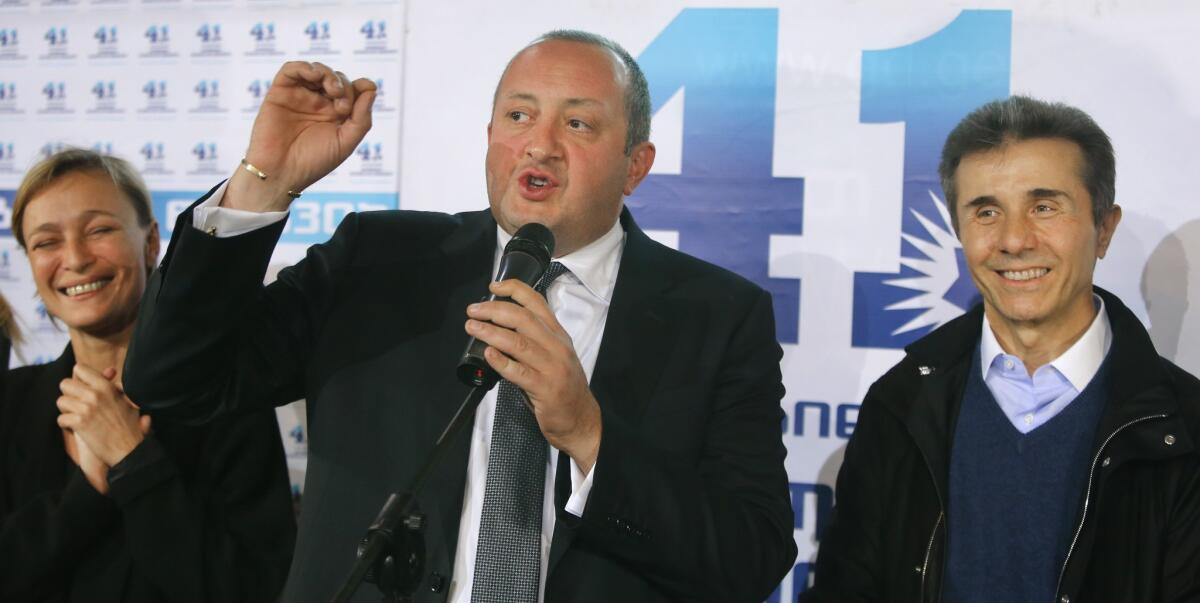From mountain guide to president: Georgia elects new leader

- Share via
TBILISI, Georgia -- Georgi Margvelashvili, a onetime mountain guide who forged a reputation in politics as a moderate voice of reason, won the presidential election in Georgia on Sunday with backing from the prime minister’s ruling coalition.
By late Sunday local time, Margvelashvili was leading with 66.7% of the vote, according to exit polls conducted by the German polling agency GFK, prompting his main opponent to concede.
The 44-year-old Margvelashvili had the backing of powerful Prime Minister Bidzina Ivanishvili and his Georgian Dream ruling coalition. He had been serving as minister of education and science in Ivanishvili’s government.
His election could portend a period of relative stability for Georgia, a former Soviet republic whose politics have been, at times, tumultuous and whose relations with neighboring Russia have been tense at best, and have flared into open conflict.
“The results mean that the confrontation between the government and parliament on one side and the president on the other is over and Georgia is entering a period of political stability,” Ramaz Sakvarelidze, an independent political analyst, said in an interview.
“In the person of Margvelashvili, we got a young, talented and very promising politician who will certainly try to lead a non-confrontational dialogue with Russia,” he said.
Margvelashvili will succeed Micheil Saakashvili, who came to power in 2004 in the so-called Rose Revolution. Saakashvili and his United National Movement supported David Bakradze, who barely received 20% of the vote, according to the exit polls.
The winner heartily thanked his team and his former boss, Ivanishvili, “who created our unity and this unity created our victory today.”
“I am grateful to every citizen who has lived through these strange nine years to put an end to this [period] with his civic stand,” Margvelashvili said in televised remarks late Sunday night, referring to Saakashvili’s tenure in office. “We have demonstrated that we are a free nation that can freely elect its leadership.”
Saakashvili, for his part, accepted his party’s defeat.
“The country elected a new president,” he said, addressing the nation in televised remarks. “I want to thank all voters, as all elections serve for the development of democracy. ... I want to address everyone who is disappointed with the results: We have to respect the opinion of the majority.”
In accepting defeat, Bakradze took a similarly magnanimous approach, saying he trusted the results of the exit polls.
“I want to set an example for everybody and congratulate Margvelashvili on the victory in the polls and accept the results we got,” Bakradze said at a briefing. “The preliminary results demonstrate that we remain a serious opposition ... as every fourth voter voted for us.”
The elections proceeded calmly and had a moderately high turnout of 46.6%.
Margvelashvili began his career as a mountain guide, later earning a doctorate in philosophy and becoming director of the Georgia Institute of Public Affairs.
His election will be watched closely for signs of how he handles relations with his outsized neighbor, Russia.
Russian-Georgian diplomatic relations were severed after the two countries fought a five-day war in 2008. The war led to the de facto breakaway of the Georgian republics of South Ossetia and Abkhazia, which declared their independence. They were recognized by Russia but very few other countries.
Russia claimed that Georgian troops attacked Russian peacekeepers on the border with South Ossetia, thus provoking a Russian invasion in August 2008. Saakashvili blamed Moscow for taking provocative actions to retaliate for Georgia’s decision in 2007 to join NATO, a plan that never came to fruition.
In the course of the swift war, the Georgian army, though rearmed with U.S. assistance and trained by U.S. instructors, retreated toward its capital of Tbilisi, sustaining massive casualties. Western pressure ultimately brought an end to the war, but Russia continued its policies in the region and even increased its military presence in South Ossetia and Abkhazia.
The defeat in the war and the unsolved problem of refugees cost Saakashvili’s party a humiliating defeat in the parliamentary election in October 2011. The newly elected parliament appointed Ivanishvili as premier and seriously limited presidential powers.
ALSO:
Syria meets deadline for plan to destroy chemical arsenal
Afghanistan tragedy: Bomb kills 18 civilians on way to wedding
Egypt crackdown complaint against Nobel laureate tossed out by judge
sergei.loiko@latimes.com
Special correspondent Jinjikhashvili reported from Tbilisi and staff writer Loiko from Moscow.
More to Read
Sign up for Essential California
The most important California stories and recommendations in your inbox every morning.
You may occasionally receive promotional content from the Los Angeles Times.










